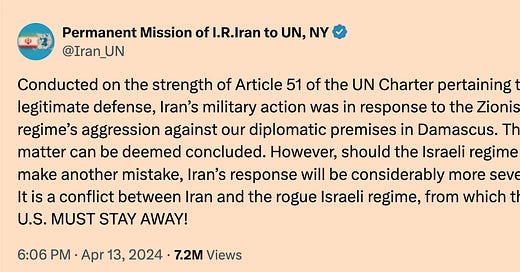The Big Story
On Saturday evening, Iran targeted Israel with hundreds of suicide drones, cruise missiles, and ballistic missiles. The vast majority of these projectiles, according to IDF Spokesman Daniel Hagari, were intercepted outside of Israel’s borders by Israeli jets and missile defense systems. “A few impacts” were identified inside Israel, including at a military base in the south, causing “slight damage to infrastructure.” One injury has been reported so far—a young Bedouin girl who was hurt in the Negev. The most recent update from Israel’s Home Front Command, sent just before 4 a.m. in Israel, said that Israelis no longer need to remain near bomb shelters, which suggests that the current wave of attacks may be over.
We are now waiting to see how Israel responds. Although an unnamed “senior Israeli official” has been quoted promising a “significant response” to the attacks, Iran appears to have pre-cleared the attacks with the United States via the Oman diplomatic backchannel. And according to Roi Kais of Israel’s Kan News, a U.S. official told Saudi Arabia’s Al-Arabiya on Friday, “the United States will take part in the response to the Iranian response if Tehran escalates the situation inappropriately”—which means that the United States tacitly approved an appropriate level of Iranian escalation, such as, we don’t know, a “symbolic” drone-and-missile attack.
The United States has also, as Barack Ravid reported Friday, demanded to “have a say before decisions are made about any retaliation by Israel.” Pair that with the series of comments on Saturday from top U.S. officials reiterating their ironclad commitment to Israel’s defense against Iran, and you get a sense of what’s really going on here. The United States will help “defend” Israel against Iran, but it will also attempt to constrain Israel from “escalating” by retaliating too aggressively against a “harmless,” “appropriate” Iranian attack.
Indeed, immediately after the attack, Iran’s permanent mission to the UN addressed the United States directly:
Translation: We did our part, now you do yours, and curb your Israeli dog.
Tablet News Editor Tony Badran explains how it works:
The United States has now set itself in between Israel and Iran. On paper, it is “equidistant” between the two parties, and its rhetoric will even emphasize its ironclad commitment to the defense of Israel (i.e., we manage Israeli “defense,” because they are an imperial province). But it also demands info on what the Israelis plan to hit, and tells them whether or not they can hit it. So, in fact, the United States isn’t equidistant at all. It’s Tehran’s bagman/lawyer/errand boy. That’s what gets telegraphed to everyone in the region, too.
Notably, the current escalation began with an Israeli attack not on Iran proper, but on Iranian assets in Syria. Here’s Tony again:
At this point in the Obama-Biden era, Israel toeing the U.S. line is a net loss of sovereignty, which will only get worse over time, further narrowing Israel’s maneuverability. The only place they have been able to operate freely [since Oct. 7] has been Syria. But even there the Dems are now telling them, actually, you can’t do that to the Iranians there. In Lebanon there are explicit limits. I mean, the administration publicly said no, you can’t go to war in Lebanon. And eat shit in Yemen too. We’ll handle “freedom of navigation.”
Tablet Staff Writer Armin Rosen, however, noted in an email to The Scroll that the Iranian attack, even if it didn’t do much “damage,” still represents a grave escalation of the degree of Iranian belligerence that Israel is expected to tolerate:
Before a single missile or drone has landed, Iran’s attack on Israel has already resulted in the closure of national airspaces across the Middle East, the deployment of Israeli, American, and British fighter jets, and an emergency that’s more or less halted life as normal in the Jewish state. If such an is classed as too “mild” or too calculatedly non-provocative to justify an Israeli strike on major Iranian assets, then Iran will have discovered a higher-than-ever threshold for consequence-free warfare against Israel and its allies. The Israelis may find themselves tempted by the absurd and dangerous argument—whether from the Biden administration or from their own war planners—that the partial neutralization of this attack somehow cancels its severity. After all, this is the moment everyone’s feared for decades, an actual, declared Iranian strike on Israel, and from a certain angle it all looks reassuringly lame. But turn a drone-and-missile barrage into a banal-enough, semi-legitimized Iranian strategic tool—no more worrying than the shutdown of Red Sea shipping or the destruction of Syria or what have you—and you are all but guaranteeing something worse.
Israel now faces a choice of whether to openly defy the Americans, or to bow to U.S. pressure and let Iran’s “appropriate” escalation slide—at the risk of accepting a new status quo in which Israeli sovereignty and security are compromised, or worse.





Something truly evil is taking place. The United States can no longer be termed an Israeli ally. I am asking the staff at The Scroll to please explain to me what is the strategic gains for the US here. At first I thought the US would use Israel to take down Iran. The other scenario is much, much worse. What is happening here? Has the whole world been infected by this parasitic virus?
All week long I have been reading in every paper about how Iran was going to attack Israel. As the week progressed I was finding it quite peculiar that the media was setting up the narrative for today’s attack. How is it possible? What is the actual truth about this attack? Another publications last sentence was how the US received assurances that none of their interests in the Middle East would be targeted. WHAT Is GOING ON??